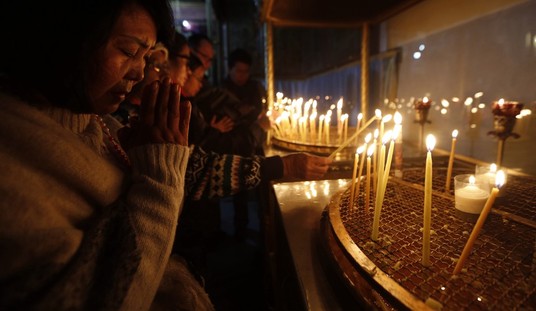It was called "The Ghost Dance," and the United States Army at the time saw it as a threat to the peace.
The dance was popular on the Pine Ridge Reservation where about 1,500 Lakota tribesmen had gathered at Wounded Knee Creek to dance and sing. The Army believed that the Ghost Dance was a ritual practiced that would bring the buffalo back. In truth, Native Americans believed that white settlers would disappear and their ancestors would lead them to good hunting grounds. It was a millennial belief that dancing would halt white expansion.
On Dec. 29, 1890, the 7th Cavalry was trying to move the Lakotan tribespeople to another reservation according to the Dawes Act that split South Dakota into five reservations. One of the Lakota medicine men told the male warriors that their ghost dance shirts were bulletproof. As they were trying to disarm the tribesmen, a weapon accidentally discharged and the soldiers opened fire.
About 300 Native Americans were killed, including men, women, and children. As a result of that action, 20 members of the U.S. 7th Cavalry received the Medal of Honor.
Congress apologized for the massacre in 1990 but refused to rescind the medals. Now, Defense Secretary Lloyd Austin has ordered a review by a special panel of experts of the circumstances that led to the awarding of the Medals of Honor after consultation with the White House and the Department of the Interior.
Congress recommended this step in the 2022 defense bill.
Medals of Honor were given to 20 soldiers from the 7th Cavalry Regiment, and their awards cite a range of actions including bravery, efforts to rescue fellow troops and actions to “dislodge Sioux Indians” who were concealed in a ravine.
Native American groups, advocates, state lawmakers from South Dakota and a number of Congress members have called for officials to revoke the awards. Congress apologized in 1990 to the descendants of those killed at Wounded Knee but did not revoke the medals.
“It’s never too late to do what’s right,” an unnamed senior defense official said in a statement Wednesday. “And that’s what is intended by the review that the secretary directed, which is to ensure that we go back and review each of these medals in a rigorous and individualized manner.”
Interestingly, Austin is recommending that the experts on the review committee examine the incident not from the perspective of 2024 but of 1890.
The panel reviewing the Medals of Honor will comprise five experts, including two from the Department of the Interior, Austin’s memo states. The panel is expected to submit a report to Austin by Oct. 15 with recommendations for each recipient, and then Austin will take those recommendations to President Joe Biden.
When reviewing the awards, panelists will consider the context at the time and use the military’s 1890 standards for awarding the Medal of Honor, rather than today’s standards.
During the "battle," dozens of soldiers were wounded and killed by friendly fire as artillery opened up and the inexperienced cavalrymen discharged their weapons haphazardly.
Gen. Nelson Miles called the carnage “the most abominable criminal military blunder and a horrible massacre of women and children."
A survivor of the massacre, Black Elk, was interviewed in 1931.
“When I look back now from this high hill of my old age,” Black Elk recalled, “I can still see the butchered women and children lying heaped and scattered all along the crooked gulch as plain as when I saw them with eyes still young. And I can see that something else died there in the bloody mud and was buried in the blizzard. A people’s dream died there.”
The dream died along with hundreds of others who didn't serve it.










Join the conversation as a VIP Member